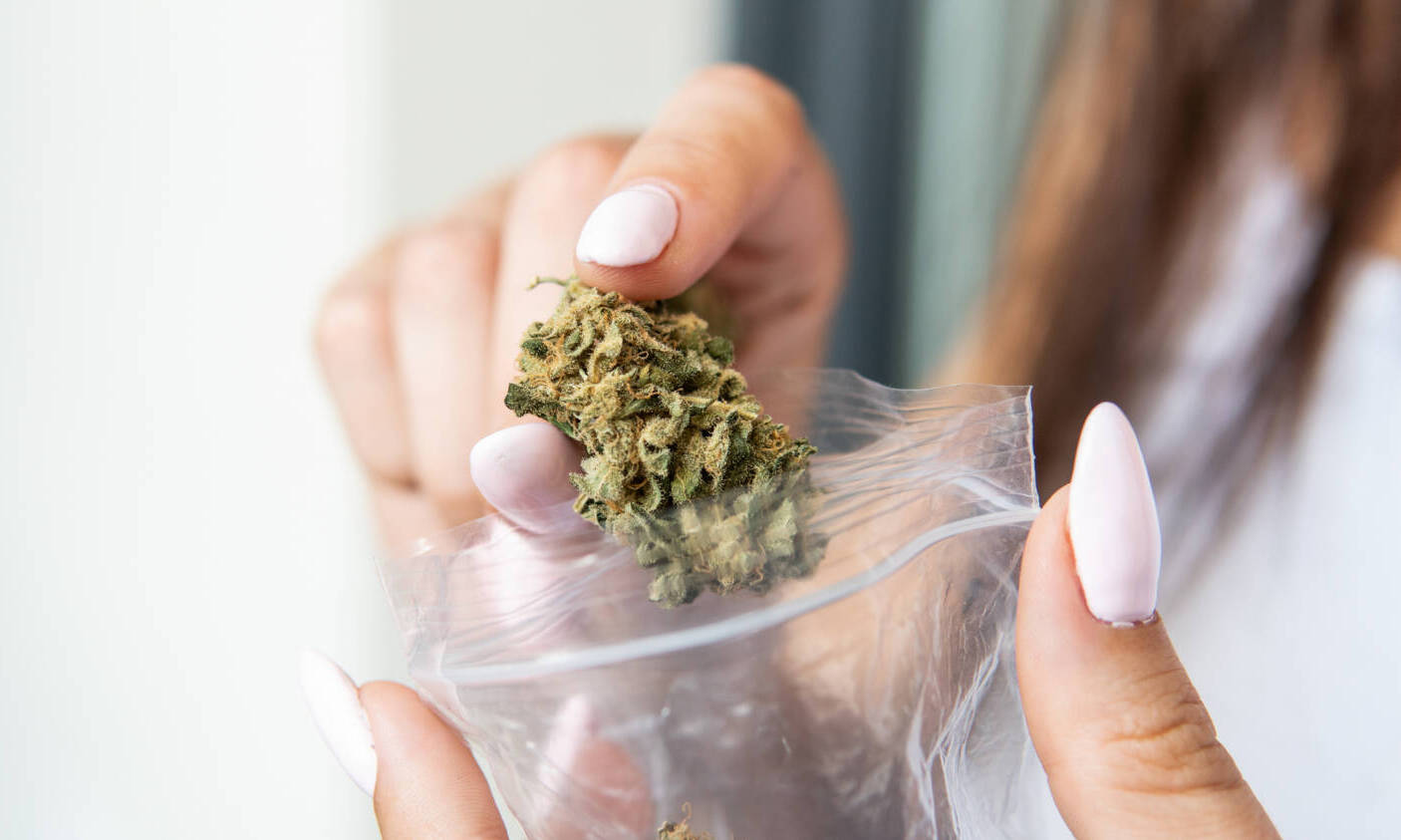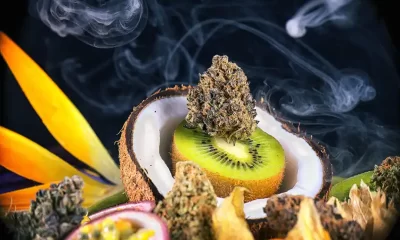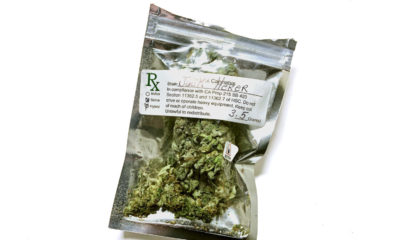Business
Top 5 Most Popular Types Of Marijuana Packaging

Here are some of the most popular and noteworthy approaches to weed packaging today to help you get a sense of how far this simple afterthought has evolved into a deciding factor in the industry.
Marijuana used to come in little, difficult to open yet easy to rip baggies. If the supplier happened to be in a festive mood, maybe the bag had some trees or smiley faces on it. Times sure have changed. With the major shifts in marijuana legalization and production over the last decade, it’s easy to forget the old days when it was illegal and there were no frills involved in the packaging.
Now, it seems, there are frills everywhere. In a legal market that is ripe with competition, everyone is in a race to think of the next big thing. Whether it is a cannabis sparkling beverage or a new type of edible — the entire market is becoming more and more saturated with concepts. Even marijuana packaging, this once simple, plastic and flimsy baggy has evolved into a major part of what sells products in the legal cannabis market.
There are, of course, legal and logistical considerations one has to make when designing packaging. But apart from that, it is often all about making a statement with how you package your weed. It can mean the success of a new budding brand or the failure of another company that gets lost in the sea of competition.
Here are five of the most popular and noteworthy approaches to marijuana packaging today to help you get a sense of how far this simple afterthought has evolved into a deciding factor in the industry.
Brand Identity
At marijuana dispensaries, it is no longer simply about the strain or whether it is indica or sativa, but who makes it and distributes it is equally important. Brands, brand recognition and reputation are already playing a role in how people perceive marijuana. One example of how packaging can shape a brand’s identity is Narvona. This company took the concept of marijuana packaging and took it to such a high concept and professional level that they won a PAC Packaging Consortium Global Packaging Award. They were the first cannabis company ever to do so in 2020.
Nicolette Pavlis, the company’s president, told Forbes, “Like everyone in this business, we wanted to show our parents what cannabis should be,” she said. “Make It legit. Make it Sephora.” The packaging, in other words, strives to give the product an identity and legitimacy, just like a makeup brand or a household product. Successful marketing like this can really help establish a brand, and that is why it has become such a popular approach to packaging.

Minimalist
Another popular packaging technique is the minimalist approach. Sleek, clean surfaces that just highlight the brand name and the product itself. You are likely to see this minimalist trend frequently, as it looks clean, follows all the compliance standards, and is also a cost effective way to give a professional look to the product. In regards to minimalist cannabis packaging, Packaging Digest said, “Taking a minimalist approach to branding can give a business a more stylish and contemporary look. Clean and simple designs still fit well with the theme of relaxation and meditation but bring the brand into the new era.”
Eco-Friendly and Organic
Eco friendly and organic approaches to packaging are also successful and popular. They compliment the natural cannabis products, and also appeal to a significant portion of the consumer base. As herbceo puts it, “Cannabis consumers are generally very environmentally aware and paying it forward in terms of eco-responsibility is one way to capture the loyalty of the millions of cannabis lovers around the world.” With more and more focus going towards the importance of a lower carbon footprint, it is likely we see a continued growth in the eco-friendly packaging market.
Compliant and Risk-Free
While compliance packaging is not exactly “trendy,” it certainly is mandatory. Most states require packaging to be a minimum of childproof, non-colorful and “opaque” with several warning labels. These laws vary significantly from state to state, with some states even requiring specific fonts to be used. These limitations, while not a specific style of packaging, can shape the way packaging looks. It is also the reason you may notice marijuana packaging varies significantly from state to state — it is not because of a lack of creativity.

Glass and Airtight Packing Still Reign Supreme
You may wonder if there is any value to the packaging, or if you should choose one type of weed over another bad on its packaging. The answer is… sometimes. If you are buying flower, especially in larger quantities, you want a container that is not simply appealing to the eye. It also must be functional.
As we previously reported, glass sealable jars like mason jar styles remain the best material to use for marijuana packaging, especially if you plan to store it for a prolonged period of time. This is why you often find some of the best flower in glass airtight containers. It is a classic look and it keeps the top quality bud fresh.
Source: https://thefreshtoast.com/cannabusiness/top-5-most-popular-types-of-marijuana-packaging/
Business
New Mexico cannabis operator fined, loses license for alleged BioTrack fraud

New Mexico regulators fined a cannabis operator nearly $300,000 and revoked its license after the company allegedly created fake reports in the state’s traceability software.
The New Mexico Cannabis Control Division (CCD) accused marijuana manufacturer and retailer Golden Roots of 11 violations, according to Albuquerque Business First.
Golden Roots operates the The Cannabis Revolution Dispensary.
The majority of the violations are related to the Albuquerque company’s improper use of BioTrack, which has been New Mexico’s track-and-trace vendor since 2015.
The CCD alleges Golden Roots reported marijuana production only two months after it had received its vertically integrated license, according to Albuquerque Business First.
Because cannabis takes longer than two months to be cultivated, the CCD was suspicious of the report.
After inspecting the company’s premises, the CCD alleged Golden Roots reported cultivation, transportation and sales in BioTrack but wasn’t able to provide officers who inspected the site evidence that the operator was cultivating cannabis.
In April, the CCD revoked Golden Roots’ license and issued a $10,000 fine, according to the news outlet.
The company requested a hearing, which the regulator scheduled for Sept. 1.
At the hearing, the CCD testified that the company’s dried-cannabis weights in BioTrack were suspicious because they didn’t seem to accurately reflect how much weight marijuana loses as it dries.
Company employees also poorly accounted for why they were making adjustments in the system of up to 24 pounds of cannabis, making comments such as “bad” or “mistake” in the software, Albuquerque Business First reported.
Golden Roots was fined $298,972.05 – the amount regulators allege the company made selling products that weren’t properly accounted for in BioTrack.
The CCD has been cracking down on cannabis operators accused of selling products procured from out-of-state or not grown legally:
- Regulators alleged in August that Albuquerque dispensary Sawmill Sweet Leaf sold out-of-state products and didn’t have a license for extraction.
- Paradise Exotics Distro lost its license in July after regulators alleged the company sold products made in California.
Golden Roots was the first alleged rulebreaker in New Mexico to be asked to pay a large fine.
Source: https://mjbizdaily.com/new-mexico-cannabis-operator-fined-loses-license-for-alleged-biotrack-fraud/
Business
Marijuana companies suing US attorney general in federal prohibition challenge

Four marijuana companies, including a multistate operator, have filed a lawsuit against U.S. Attorney General Merrick Garland in which they allege the federal MJ prohibition under the Controlled Substances Act is no longer constitutional.
According to the complaint, filed Thursday in U.S. District Court in Massachusetts, retailer Canna Provisions, Treevit delivery service CEO Gyasi Sellers, cultivator Wiseacre Farm and MSO Verano Holdings Corp. are all harmed by “the federal government’s unconstitutional ban on cultivating, manufacturing, distributing, or possessing intrastate marijuana.”
Verano is headquartered in Chicago but has operations in Massachusetts; the other three operators are based in Massachusetts.
The lawsuit seeks a ruling that the “Controlled Substances Act is unconstitutional as applied to the intrastate cultivation, manufacture, possession, and distribution of marijuana pursuant to state law.”
The companies want the case to go before the U.S. Supreme Court.
They hired prominent law firm Boies Schiller Flexner to represent them.
The New York-based firm’s principal is David Boies, whose former clients include Microsoft, former presidential candidate Al Gore and Elizabeth Holmes’ disgraced startup Theranos.
Similar challenges to the federal Controlled Substances Act (CSA) have failed.
One such challenge led to a landmark Supreme Court decision in 2005.
In Gonzalez vs. Raich, the highest court in the United States ruled in a 6-3 decision that the commerce clause of the U.S. Constitution gave Congress the power to outlaw marijuana federally, even though state laws allow the cultivation and sale of cannabis.
In the 18 years since that ruling, 23 states and the District of Columbia have legalized adult-use marijuana and the federal government has allowed a multibillion-dollar cannabis industry to thrive.
Since both Congress and the U.S. Department of Justice, currently headed by Garland, have declined to intervene in state-licensed marijuana markets, the key facts that led to the Supreme Court’s 2005 ruling “no longer apply,” Boies said in a statement Thursday.
“The Supreme Court has since made clear that the federal government lacks the authority to regulate purely intrastate commerce,” Boies said.
“Moreover, the facts on which those precedents are based are no longer true.”
Verano President Darren Weiss said in a statement the company is “prepared to bring this case all the way to the Supreme Court in order to align federal law with how Congress has acted for years.”
While the Biden administration’s push to reschedule marijuana would help solve marijuana operators’ federal tax woes, neither rescheduling nor modest Congressional reforms such as the SAFER Banking Act “solve the fundamental issue,” Weiss added.
“The application of the CSA to lawful state-run cannabis business is an unconstitutional overreach on state sovereignty that has led to decades of harm, failed businesses, lost jobs, and unsafe working conditions.”
Business
Alabama to make another attempt Dec. 1 to award medical cannabis licenses

Alabama regulators are targeting Dec. 1 to award the first batch of medical cannabis business licenses after the agency’s first two attempts were scrapped because of scoring errors and litigation.
The first licenses will be awarded to individual cultivators, delivery providers, processors, dispensaries and state testing labs, according to the Alabama Medical Cannabis Commission (AMCC).
Then, on Dec. 12, the AMCC will award licenses for vertically integrated operations, a designation set primarily for multistate operators.
Licenses are expected to be handed out 28 days after they have been awarded, so MMJ production could begin in early January, according to the Alabama Daily News.
That means MMJ products could be available for patients around early March, an AMCC spokesperson told the media outlet.
Regulators initially awarded 21 business licenses in June, only to void them after applicants alleged inconsistencies with how the applications were scored.
Then, in August, the state awarded 24 different licenses – 19 went to June recipients – only to reverse themselves again and scratch those licenses after spurned applicants filed lawsuits.
A state judge dismissed a lawsuit filed by Chicago-based MSO Verano Holdings Corp., but another lawsuit is pending.
Source: https://mjbizdaily.com/alabama-plans-to-award-medical-cannabis-licenses-dec-1/
-

 Business2 years ago
Business2 years agoPot Odor Does Not Justify Probable Cause for Vehicle Searches, Minnesota Court Affirms
-

 Business2 years ago
Business2 years agoNew Mexico cannabis operator fined, loses license for alleged BioTrack fraud
-

 Business2 years ago
Business2 years agoAlabama to make another attempt Dec. 1 to award medical cannabis licenses
-

 Business2 years ago
Business2 years agoWashington State Pays Out $9.4 Million in Refunds Relating to Drug Convictions
-

 Business2 years ago
Business2 years agoMarijuana companies suing US attorney general in federal prohibition challenge
-

 Business2 years ago
Business2 years agoLegal Marijuana Handed A Nothing Burger From NY State
-

 Business2 years ago
Business2 years agoCan Cannabis Help Seasonal Depression
-

 Blogs2 years ago
Blogs2 years agoCannabis Art Is Flourishing On Etsy













